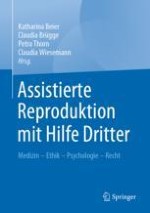Abstract
In this chapter we set out some of the history of legislation around third party conception in the UK and the origins and development of the Donor Conception Network alongside our personal journey as a couple with adult donor conceived children. The ethical approach to donor conception in the UK has always been pragmatic. Whilst bishops declared it immoral in the 1950s, parliament did nothing and a small number of doctors carried on practising sperm donation. In more recent times, there has been legislation from parliament and guidance from the regulator the HFEA. Both have given more prominence to the rights of donor conceived people, particularly with the ending of anonymity for donors in 2005. DC Network is a parent-led but child-centred organisation, supporting parents in making decisions relating to donor conception, and in particular in being open with their children and others. Some donor conceived adults challenge the Network’s position seeing it as encouraging a practice (donor conception treatment) they regard as unethical. As parents we defied the secrecy of our era and shared information about their origins with our children from a young age, and went on to assist in the foundation and leadership of the Network.











